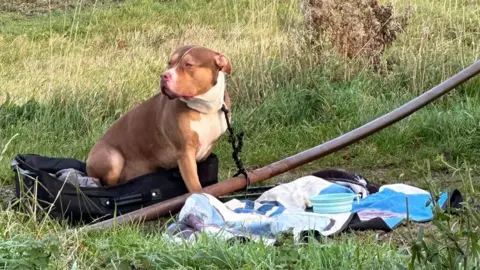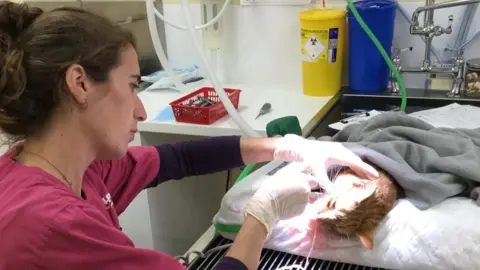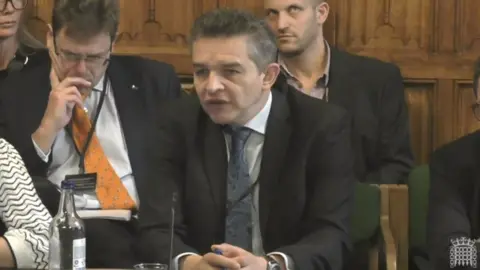American bully XLs: Fear of spike in dumped dogs under ban
 Meg Broady
Meg BroadyDog rescue centres fear numbers of abandoned bully XL dogs will rise if vets cannot cope with the demands of a ban coming into effect next month.
Owners of the breed will have to have dogs neutered, microchipped, and exempted, or have them euthanised.
If vets do not have the capacity to help, owners may have "nowhere else to turn", the Association of Dogs and Cats Homes (ADCH) has warned.
The government said it took "quick and decisive action" to protect the public.
It comes after the founder of a pet rescue centre told the BBC the government's ban on American bully XLs had led to dogs being abandoned and "killed en masse".
The government decided to ban the breed under the Dangerous Dogs Act 1991 following a rise in fatal attacks.
Owners wishing to keep their dogs have until the end of January 2024 to microchip and then register them on the Index of Exempted Dogs, and will eventually need to get them neutered.
If the dog is less than a year old on 31 January, it must be neutered by the end of the year, but if it is older than a year, it must be neutered by 30 June.
'Postcode lottery'
Owners who choose not to keep their dog must take it to be euthanised by a vet by the end of January and can claim £200 towards the cost.
The ADCH, which is a representative charity for dog and cat rehoming organisations across the UK, said it had many concerns on how the ban would work, "particularly around veterinary capacity for euthanasia and neutering", as well as vets who refused to euthanise healthy dogs on ethical grounds.
"We fear that these factors will result in a postcode lottery on helping owners euthanise or neuter their bully XLs, and could increase abandonment rates for owners that have nowhere else to turn," the charity said.
 Sue Taylor
Sue Taylor Rebecca Taylor, a locum vet in Dorset, said she would not be putting down "healthy" bully XLs.
"I use the term healthy - that covers their behaviour and mental health as well as their physical health," she said.
"To me and a lot of other vets, a dog with significant behavioural problems is not a healthy dog.
"But for me - my ethics and morals - I didn't become a vet to put down healthy animals… And for me I can't justify that."
The Royal College of Veterinary Surgeons' Code of Professional Conduct says "no veterinary surgeon is obliged to kill a healthy animal unless required to do so under statutory powers as part of their conditions of employment".
Ms Taylor said she also had concerns it would be difficult for vets to cope with euthanasia and neutering requests in areas where there were more bully XLs.
"When I was working nearer to London, there's more there. If I work up in Middlesbrough, there's more up there," she says.
"I'm just in a rural pocket at the moment where there's not.
"It's not that straightforward to just have dogs traveling across the country to get neutered and then [it] has to be travelling a long way post-surgery, and then if there's any complications after the operation, they'd still need to go to their local vet."
 UK Parliament
UK ParliamentIn October, David Martin, an animal welfare advisor for leading veterinary group IVC Evidensia, told a government committee that in a survey of 200 of new employees, 94% said they would not euthanise a healthy bully XL with no behavioural problems.
He said if the government asked them "to neuter 40,000 Jack Russells in a six-month period" vets would have enough kennel space to house them for the day, but for "40,000 very large dogs" space would be a "limiting factor".
"We would only probably be able to do one or two in a surgery per day, just simply because we haven't got the kennel space to house them while they wake up from their anaesthetics," he added.
From 31 December it will be against the law to sell, abandon, give away, or breed a bully XL, or have one in public without a lead and muzzle.
From 1 February 2024, owning a bully XL dog in England and Wales without an exemption certificate will be a criminal offence, resulting in an unlimited fine and seizure of the dog.
American bully XLs in rescue centres will either be "stuck" there for life or put down after the December deadline, Ms Taylor says, as rehoming them will be illegal.
 Reuters
ReutersOwners wanting to exempt a bully XL will need to pay for a number of things including the application which costs £92.40, third-party public liability insurance and neutering.
Their pets must also be microchipped, which applies to all dogs - regardless of their breeds - by the time they are eight weeks old.
This "chunk of money" that owners weren't anticipating to spend could be a struggle for some, Ms Taylor said.
The Department for Environment, Food and Rural Affairs advised bully XL owners whose vet had refused to euthanise their dog to ask a different vet, or to discuss with them alternative veterinary practices that they could recommend.
A spokesperson said: "We have taken quick and decisive action to protect the public from tragic dog attacks, with the XL Bully type added to the list of dogs prohibited under the Dangerous Dogs Act.
"Up until 31 January 2024, owners of XL Bully type dogs have the options of applying for a Certificate of Exemption or taking their dog to be euthanised by a vet.
"We are working closely with the police, canine and veterinary experts, and animal welfare groups as we take forward these important measures."
